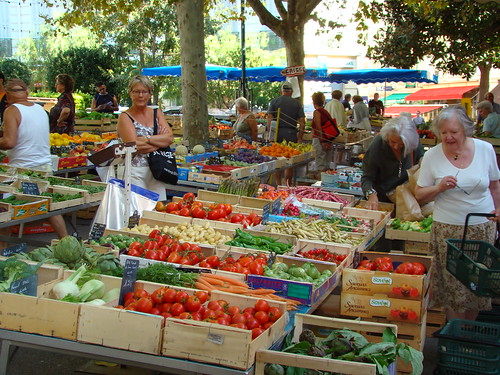
The market in Beaulieu-sur-Mer last week
I’ll never look at a market in quite the same way again after reading Market Day in Provence, by Michele de la Pradelle. She made an anthropological study of three markets in the Provence city of Carpentras, in 1980 (the book has only recently been translated), looking at the wholesale market where farmers sold to wholesalers on the outskirts of the city, the traditional retail market, and the secretive but famous, although little observed by outsiders truffle market.
She finds, perhaps unsurprisingly, that although situated in a largely intact medieval city, most of the “historic practices” have in fact been reconstructed.
“In this age of supermarkets, the stallholder market distribution mode is necessarily perceived as archais, an impression reinforced by the way it is staged. The types of social relations induced by market exchange appear to actors to bear the mark of either a premodern or an exotic world. Calmly doing one’s marketing with one’s shopping bag on one’s arm while chatting from stall to stall with people one chances to encounter is also playing at being of another time…. A market is a collectively produced anachronism, and in this it responds to deeply contemporary logic.” (p.234-5)
She points out that the products almost invariably are exactly the same ones as youd buy in the market (look at the veggies above and you can see that), and even the “farm produce” or “home-made” ones are usually a carefully constructed fiction: “His stall is made of a simple plank of wood…he has carefully lined up a few bunches of leeks; handwritten on chalk on a small chalk board above them are the words: “leeks, untreated, 6F”… The nature that Roux stages is that of the Sunday gardener: cherries eaten straight off the tree, patiently transplanted lettuce whose progress is observed daily. These are patently healthy vegetables…” (Although Pradelle notes that this is more commonly seen at L’Isle-sur-la-Sorgue, “where the Sunday secondhand market pulls in a big tourist crowd”.
She also closely observes the interactions: “The joking is what gives the market exchange relation its specific form, turning a series of disparate customers into a small society of equals.” By contrast, she says, in a shop, the status of the customer is always carefully observed and reacted to. She also notes that close friends, who would usually have to go through elaborate rituals, can get by with a quick peck on the cheek in the market – the fiction (usually) that this is busy business allowing simple exchanges in complicated relationships.
We’re a complicated race, we humans…

 About
About
3 Comments
Pingback: Celebrex.